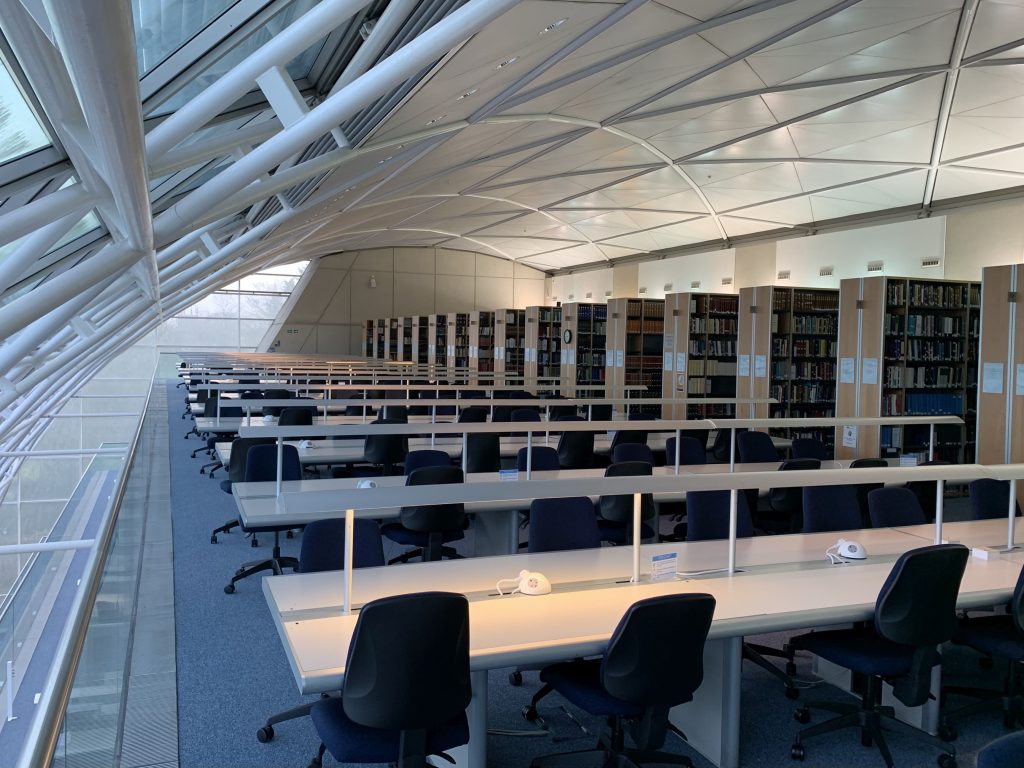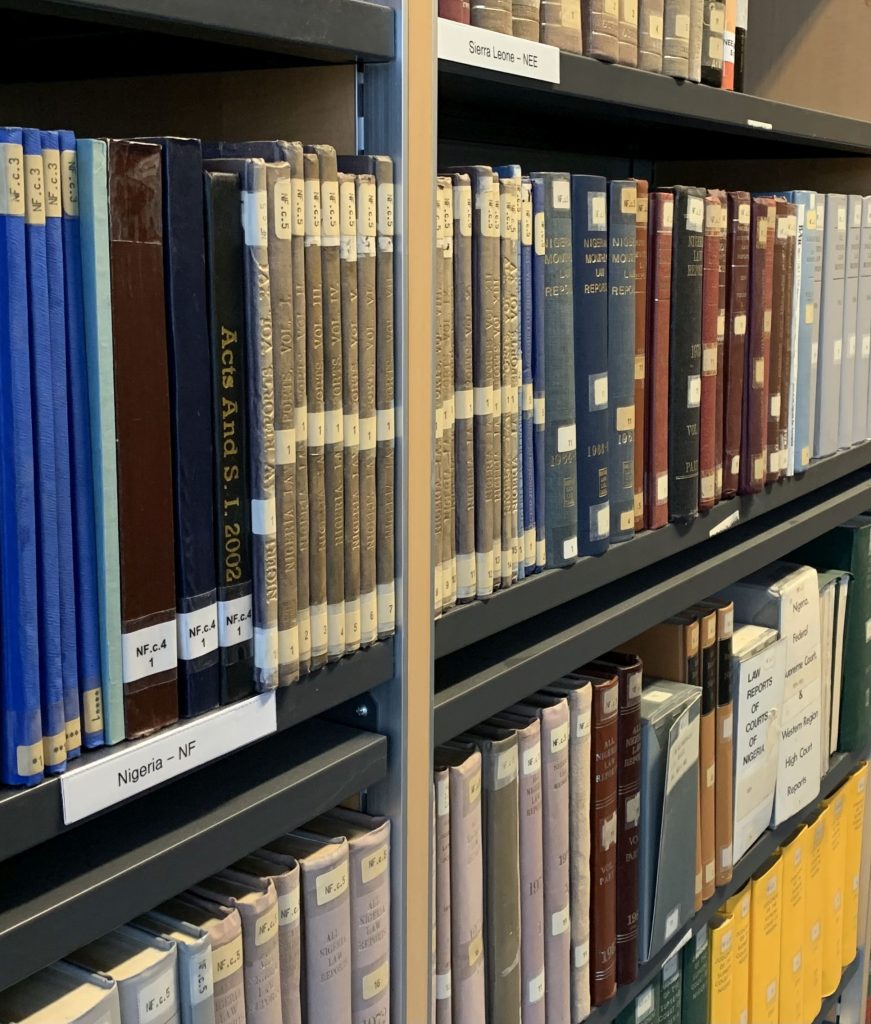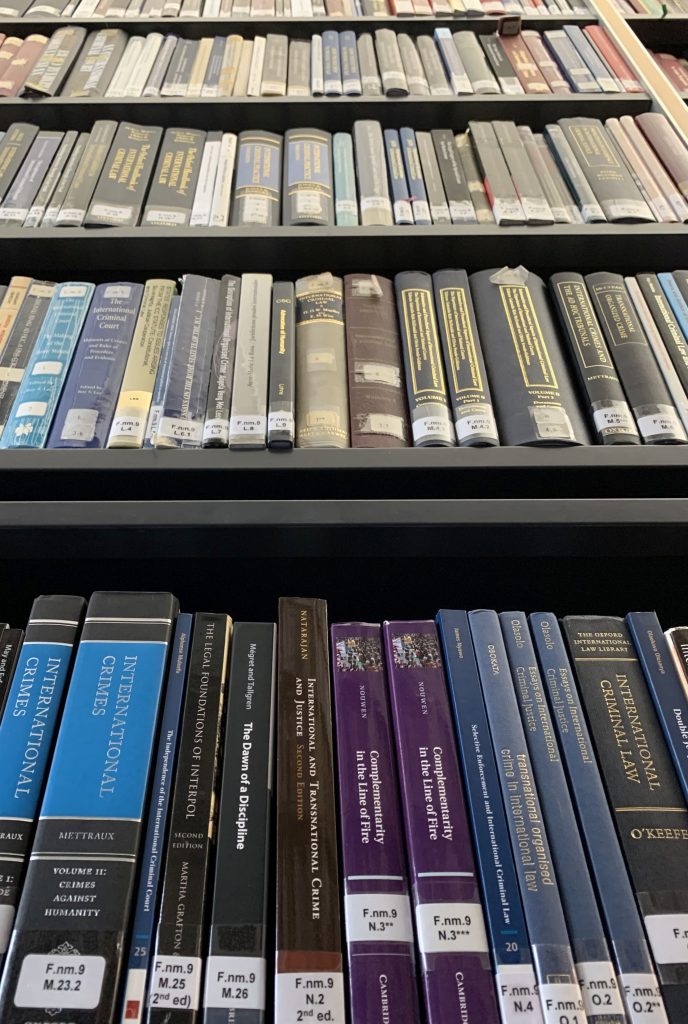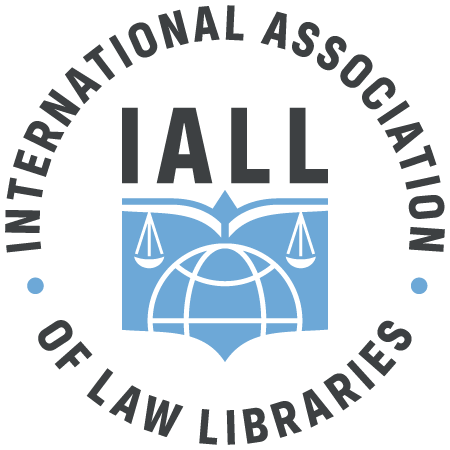By: David Wills
Squire Law Librarian Squire Law Library, University of Cambridge.
Member of the IALL Board of Directors
I was delighted recently to be elected to the Board of Directors of the International Association of Law Libraries (IALL). Taking up post, has caused me to reflect on the way in which the international collections at my library, the Squire Law Library at the University of Cambridge, have grown over the years. In the hurly-burly of the day-to-day, we often don’t think about the significance of the collections for which we are responsible or ponder the challenges for future development.

The Squire was established in 1904 – although, of course, the University of Cambridge has had international law collections dating back over centuries. Over the past 120 years the Squire has developed an international reputation and consciously, and serendipitously, curated a strong, varied, broad and in-depth collection of resources covering so many jurisdictions from across the world. We are proud to have materials from the common law-based jurisdictions, the civil law countries and other legal systems and traditions from all around the world.
We have developed collections in comparative law, European legal history, EU law and with much emphasis on public international law. To give a sense of the importance of our international law collections, it is worth noting that two of the three floors which the Squire occupies in the David Williams Building on the University’s Sidgwick Site[i] are dedicated to these collections. Only one floor is devoted to English law, legal history and a general section on jurisprudence. We are, truly, a treasure-trove of international law resources!
The Squire, in common with most academic institutions, has curated its library collections according to the needs of our community of researchers and students, whether to facilitate research interests or to support teaching and learning endeavours, or both. Indeed, the University of Cambridge prides itself on its research-led teaching. Since the 1930s there has been a conscious effort to develop the Squire’s international and comparative law collections focusing on the interests of academic law colleagues.[ii] We have been so fortunate to benefit from having in our Faculty, now and in the past, some incredibly eminent and prominent legal scholars. Their engagement in, and support for, the work and collections of the Squire and their specific academic interests, has directly informed some of our collecting decisions. These scholars include such luminaries as Professor Kurt Lipstein (Professor of Comparative Law, 1973-1976), Professor James Crawford (Whewell Professor of International Law, 1992-2014) and the recently retired Professor David Ibbetson (Regius Professor of Civil Law, 2000-2022).[iii] They, and many, many more over the course of decades, have taken a keen interest in the library making recommendations for acquisitions and/or donating material to enhance the quality and breadth of the collections. We have also been fortunate to welcome, from around the world, law scholars and other visitors with a legal interest to the Cambridge Law Faculty and the Squire Law Library. They are part of our wider community and they too have contributed to the advancement of the collections advising on useful acquisitions and donating publications during their stay. As a result of, as it were, both our home team and the cohort of visiting academics, we have been able to develop a collection with a historical depth covering most European countries, many African nations, the Americas, Asia, Australasia and the Middle East – everywhere from Argentina to Zimbabwe.
The Squire also has impressive collections in the general field of comparative law, including in comparative public law and environmental law. In recent years, we have seen a significant expansion in the fields of corporate and commercial law, in banking and financial law, and also in tax law, as well as intellectual property. This reflects the Faculty’s growing reputation in those particular areas. The one-year Cambridge LLM programme and the Masters in Corporate Law (MCL) taught courses are highly sought-after and entry is competitive, attracting students from around the world. There have also been new, emerging and exciting comparative law topics in which to collect, such as artificial intelligence and the law (a real growth area), and matters relating to the law of blockchain and cryptocurrency. Watch this space!

The Faculty has had a considerable and richly-earned reputation in the field of public international law through such figures as Professor John Westlake, Sir Hersch Lauterpacht, Sir Robert Jennings and Professor James Crawford (who I have already mentioned). This is well reflected in an extensive collection, and we are fortunate that many of the works which we hold have been inherited from the personal libraries of scholars in the field. This particular collection is both historical and contemporary in terms of its content and is widely consulted and used for teaching and scholarly research.[iv]

So, what issues, considerations and challenges do I feel that we face in continuing to build our international law collections? These are turbulent and unpredictable times and the pace of change is unprecedented.
In so many respects, online content is overtaking the more traditional print format; change has been swift. Approaches to teaching and learning, the methods and techniques for conducting legal research and the overall expectations of our law students and researchers have altered accordingly and in a relatively short period of time.
There is much to contemplate. Let me just put down a few initial thoughts, in no particular order.
- It remains a substantial task to identify and acquire relevant materials and online resources, covering both primary and secondary legal sources reflecting the law across all corners of the world and reflecting current and emerging scholarly and teaching interests.
- The accelerated growth in, and availability of, online content has recently altered the landscape considerably and managing and ensuring a comprehensive coverage in multiple formats has its challenges.
- In times of financial constraint, maintaining such a large international collecting profile continues to have its budgetary challenges.
- It is really tricky to navigate ebook licensing restrictions and constraints across so many countries in an effort to ensure balanced provision across the legal world internationally.
- It is absolutely vital that we all focus on the diversification and decolonisation of legal collections in collection building, content strategy and classification of resources.
- First and foremost, we have a duty to ensure and improve the quality of access for all researchers and students – both in terms of physical and remote access to the collections and in terms of accessibility consistent with our fundamental responsibility for equality, diversity and inclusion in all that we do.
For all of us, balancing provision between print and electronic options is a significant challenge – and is likely to remain a fine balancing act. It is an inevitable fact that the accelerated growth of electronic provision has fundamentally altered the course of collection development and, in general terms, has impacted on overarching content strategy.
Whatever the future brings, we will continue to work in partnership with our academic colleagues, as we collect and curate law resources. Academic endeavour and collection curation will, as they always have done, work hand in hand – as has been evident at the Squire Law Library over many decades.
[i] For an account concerning the David Williams Building and the Squire Law Library, see: David Wills, ‘The Squire Law Library: Celebrating Foster’s Design. A Return to Forever’ (2021) 21 Legal Information Management 146-159.
[ii] For a history of the Squire Law Library and an account of the growth of its collections, see: W.A. Steiner, ‘The Squire Law Library of the University of Cambridge’ in Jürgen Christoph Gödan and Holger Knudsen (eds), Bibliothek und Recht-international: Festschrift Ralph Lansky. Hamburg; Augsburg: Arbeitsgemeinschaft für Juristisches Bibliotheks- und Dokumentationswesen, 1991.
[iii] Interviews with many scholars from recent times have be included in the Eminent Scholar Archive (ESA) that was founded and developed by Lesley Dingle, the former Foreign and International Law Librarian at the Squire Law Library. See: https://www.squire.law.cam.ac.uk/cambridge-law-eminent-scholars-archive This unique archive won the Wallace Breem Memorial Award in 2020.
[iv] For an account of the development of the public international law collections at the Squire, see: Lesley Dingle, ‘The Squire Law Library at Cambridge: the Historical Development and Current Status of the International Law Collections’ (2017) 17 Legal Information Management 78-91.
This Blog contains entries by members of the International Association of Law Libraries on issues germane to the Association’s areas of focus. Views expressed in an individual entry only represent the views of the author.
